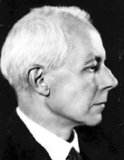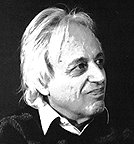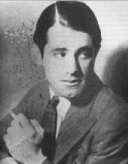THE SHiNiNG


Bela Bartok
(Nagyszentmiklós, Hungary - today Sînnicolau
Mare, Romania - , 25 March 1881; New York, 26 September 1945).
Hungarian composer, pianist and ethnomusicologist; by far the most
important of Hungarian composers and responsible, with Zoltán Kodály, for
the awakening of the interest in Hungarian folk music. While being thus
occupied Bartók never neglected his engagement with Western art music.
Initially his musical style was influenced by composers such as Brahms, R.
Strauss, Debussy and Stravinsky. These influences gradually loosed their
ground to the impact Hungarian, Slavonic and Romanian folk music began to
exert on him, a consequence of his activities in the field of
ethnomusicology. Notwithstanding these influences Bartók developed a
distinctive personal style, a style to which the audience of his own days
did not always respond, but which, towards the end this century, is met
with more and more appreciation and admiration.
A selection from Bartók's vast output: Concerto for Orchestra, Dance
Suite, Divertimento, Music for Strings, Percussion and Celesta, 3 Piano
Concertos, 2 Violin Concertos, Viola Concerto, the opera Bluebeard's
Castle, the pantomime The Miraculous Mandarin, the ballet The Wooden
Prince, Chamber Music: 6 String Quartets, Contrasts (written for Benny
Goodman), Piano Music: For Children, Mikrokosmos, Sonatas, Bagatelles,
Folk Song transcriptions and many other pieces.
-from the Philips Music Group Website

Gyorgy Ligeti
(Dicsozentmarton, Transylvania - 28 May 1923 –
12 June 2006)
Ligeti was born of Hungarian Jewish parents in Dicsozentmarton,
Transylvania, an area that has yo-yoed back and forth between Hungary and
Romania. He received a fine musical education, first at the Kolozsvar
Conservatory, and later at the Budapest Academy of Music. After his
graduation in 1949, like his countrymen Bartok and Kodaly, he pursued
field research in folk music; Romanian folk music in particular. In 1950,
he was appointed Professor of Harmony, Counterpoint and Formal Analysis at
the Budapest Conservatory, a post he held until he fled Hungary in 1956.
During these years his published music consisted of arrangements of folk
music or music in the folk idiom, although he was also working on more
daring experimental music (as is evidenced from sketches and scores). The
political climate made it impossible, as well as improvident, to publish
any of the works in the style that was to bring him international
recognition. However, it was during this period before the Hungarian
uprising that the Bagatelles were composed. Although the Fifth Bagatelle
is an outright memorial to the memory of Bela Bartok, all of these
delightful miniatures bear resemblance to some of Bartok’s own folkloric
works, as well as a good measure of Stravinsky, particularly No. 4 and No.
6.
After leaving Hungary and settling in Vienna, Ligeti’s stature as a
composer continued to grow. He has held many important and prestigious
posts throughout Europe. As for the Bay Area, Ligeti was Lecturer and
Composer-in-Residence at Stanford University in 1972. Among his works is a
piece for orchestra dating from 1974 entitled San Francisco Polyphony.

Krzysztof Penderecki
(Debica, Poland - 23 November 1933 – 29
March 2020)
Penderecki is one of the most esteemed and widely discussed composers of
our time. The development of his compositional style has reflected the
evolution of new music from the avant-garde of the sixties up to the
present day, while preserving his own distinctive voice.
Like other leading composers of our century, Mr. Penderecki has also
built an international reputation as a conductor. In Europe he has
conducted the Berlin Philharmonic as well as orchestras in France,
England, Italy, Austria, Sweden and Switzerland, and his American
appearances have included performances with the New York Philharmonic
and the Philadelphia Orchestra, among others. He also holds two
permanent posts: as principal guest conductor of the NDR Orchestra in
Hamburg and as music director of the Casals Festival in Puerto Rico.
After finishing his studies at the Krakow High School of Music, Mr.
Penderecki immediately began his rise to prominence, winning all three
prizes at the 1959 contest of the Polish Composers' Association. In
early works such as Emanations, Strophes, and most notably the Threnody
for the Victims of Hiroshima, he put himself at the forefront of the
avant-garde, combining a highly experimental and expressionistic use of
sound with a radical humanistic message.
The highlight of this first phase of Mr. Penderecki's work occurred with
the premiere of his most famous work, the St. Luke Passion, in Münster
Cathedral in 1966, the first in a series of liturgical works including
Dies Irae, dedicated to the victims of Auschwitz (1967), Utrenja ("The
Entombment of Christ" and "The Resurrection of Christ," 1970-71), and
Magnificat (1974). Mr. Pendercki's style gradually turned toward simple
structures and a more traditional tonal language in these works, moving
toward a contemporary neo-Romanticism. Other works from this period
include the Violin Concerto (1976-77), written for Isaac Stern, and the
Te Deum (1980), dedicated to Pope John Paul II.
Mr. Penderecki also established his reputation as a musical dramatist
during these years, first with The Devils of Loudun (1969), followed by
Paradise Lost, premiered in Chicago in 1978. His third opera, The Black
Mask, achieved a major success in its premiere at the 1986 Salzburg
Festival, and with the opera buffa Ubu Rex (1990-91), adapted from
Alfred Jarry, Mr. Penderecki has created a burlesque in the spirit of
Rossini.
In the 1980's, Mr. Penderecki began to connect the acerbic sounds of his
first period with the romantic gestures of the second, thus creating
music of universal humanistic expressiveness. Among the most notable
works of this period are the Cello Concerto No. 2 (1982), the Viola
Concerto (1983) and the Polish Requiem (1984), a work which is the
composer's memorial to the oppression of his country and a declaration
of solidarity with its stuggle for freedom.
Mr. Penderecki has completed a number of symphonies and concertos in
rapid succession since 1988, including the recent Symphony No. 5
(1991-92); the Flute Concerto (1992), written for Jean-Pierre Rampal;
the Sinfonietta No. 2 for Clarinet and Strings (1994) and the Concerto
for Clarinet and Chamber Orchestra.
Two of his most recent works, the Violin Concerto No. 2 (1992-95),
written for Anne-Sophie Mutter, and the newly completed Symphony No. 3,
received their United States premieres at Carnegie Hall in the fall of
1996. His notable chamber music compositions have included Per Slava
(1985-86), written for Mstislav Rostropovich, The Interrupted Thought
for string quartet (1988), the String Trio (1990-91) and the
Divertimento for Solo Cello. Among the numerous awards and prizes Mr.
Penderecki has won are the UNESCO Award, the Great Art Award of North
Rhine-Westphalia, the Prix Italia (in both 1967 and 1968), the Prix
Artur Honegger, the Sibelius Prize, the Premio Lorenzo Magnifico, the
Grawemeyer Award for Music Composition and a Grammy Award, among many
others. He has also received two Emmy nominations for the A&E
Network broadcasts from the Casals Festival. Nine universities, among
them Glasgow, Madrid and Belgrade, have conferred honorary doctorates on
Mr. Penderecki.
From 1972 to 1979, he was director of the Krakow High School of Music,
and from 1973 to 1978 he taught at Yale University as well. He is an
honorary member of the Royal Academy of Music in London, the Royal
Academy of Music in Dublin, the Accademia di Santa Cecelia in Rome, the
Royal Academy of Music in Stockholm and the Akademie der Künste in
Berlin, and bears the Order of Merit of the the Federal Republic of
Germany and has recently been named Freeman of the City of Strasbourg.
- from the CBC RadioTwo Website

Wendy Carlos
(Pawtucket, Rhode Island - November 14,
1939)
Composer Wendy Carlos spurred electronic music to new commercial heights
during the late '60s, popularizing the synthesizer with the enormously
successful Switched-On Bach album. Born in Pawtucket, Rhode Island on
November 14, 1939, Carlos pursued her M.A. in composition under Vladimir
Ussachevsky and Otto Luening at Columbia University's famed
Columbia-Princeton Electronic Music Center. Following her graduation,
she moved to Manhattan, where she found work as a recording engineer. In
Manhattan, she met Dr. Robert Moog and, not long afterward, she began
playing the Moog synthesizer.
Carlos released her first recording, Switched-On Bach, in 1968. A
showcase for the Moog synthesizer, Switched-On Bach interpreted the
legendary composer's most renowned fugues and movements via
state-of-the-art synth technology; purists were appalled, but the record
captured the public's imagination and in time the album became the first
classical record to be certified platinum by the RIAA. It also earned
three Grammy Awards. A similar effort, The Well-Tempered Synthesizer,
followed in 1969. In 1971, Carlos wrote the music for Stanley Kubrick's
controversial film A Clockwork Orange, introducing the vocoder -- an
electronic device designed to synthesize the human voice -- in her
score. After 1976's Brandenburg Concertos 3-5, Carlos again worked with
Kubrick, providing the score for his 1980 adaptation of Stephen King's
The Shining. Two years later, she wrote music for Tron, Disney's action
movie about video games. Subsequent efforts included a spoof of
Prokofiev's Peter and the Wolf recorded with Weird Al Yankovic and
Switched-On Bach 2000.
- All-Music Guide

Al Bowlly
(Born Jan 7, 1899 in Mozambique. Died Apr
17, 1941 in London, England)
The most popular vocalist in Britain during the 1930s, Al Bowlly
showcased a range of material unsurpassed by any contemporary other than
Bing Crosby. He was also a true international recording artist: born in
Mozambique to Greek and Lebanese parents, he was raised in Johannesburg,
but gained his musical experience singing for a dance band led by Jimmy
Liquime in India and Singapore during the mid-'20s. Just one year after
his 1927 debut recording date in Berlin, Bowlly arrived in London for
the first time, as part of Fred Elizalde's orchestra. That year, "If I
Had You" became one of the first popular songs by an English jazz band
to become renowned in America as well, and Bowlly had gone out on his
own by the dawn of the '30s. During the next three years, he recorded
over 500 songs and appeared with orchestras led by Ray Noble and Lew
Stone. A visit to New York in 1934 with Noble resulted in more success;
he appeared at the head of an orchestra hand-picked for him and Noble by
Glenn Miller (the band included Claude Thornhill, Charlie Spivak and Bud
Freeman, among others).
During the mid-'30s, such songs as "Blue Moon," "Easy to Love," "I've
Got You Under My Skin" and "My Melancholy Baby" were sizable American
successes -- so much so that Bowlly gained his own radio series on NBC
and traveled to Hollywood to film The Big Broadcast of 1936, which also
starred one of his biggest competitors, Bing Crosby. He was back in
England that same year, appearing with his own band, the Radio City
Rhythm Makers, as well as the orchestras of Sydney Lipton, Geraldo and
Ken Johnson. Partnered with Jimmy Messini, Bowlly also branched out onto
the London stage during the early '40s with an act called Radio Stars
with Two Guitars. It was his last venture before his death in 1941, the
victim of a German bomb exploded outside his apartment. Fifty years
after his death, a British musical named Melancholy Baby toured the
country with much success.
- All-Music Guide
THE ReCORDiNGS
For those of you who'd like to hunt down
the music, you can find everything on the following albums:
The Shining-Original Soundtrack (Warner Bros HS3449) Lp
Gyorgy Ligeti-Concert for Cello & Orchestra/Lontano
(Wergo WER60163-50) CD
Bela Bartok-Concerto for Orchestra/Music for Strings, Percussion
& Celesta (Deutsche Grammophon 415 322-2) CD
Krzysztof Penderecki Vol.1-St. Lukes Passion/Threnody/Polymorphia
(Muza PNCD 017 A) CD
Krzysztof Penderecki Vol.2-Utrenja (Muza PNCD 018) CD
Krzysztof Penderecki Vol.4-Cello Concerto No.2/Awakening of Jacob
(Muza PNCD 020) CD
Krzysztof Penderecki Matrix 5-De Natura Sonoris #'s 1 & 2
(EMI Classics CDM 5 65077 2) CD
Penderecki Conducts Penderecki Album 1-Kanon for Orchestra &
Tape (Angel Records – S-36949) Lp
The Ray Noble Hits Collection 1931-47-It's All Forgotten Now(Acrobat
– ADDCD3312) CD
The Ray Noble Orchestra Featuring Al Bowlly – The HMV Sessions
1930-34 (Volume Seven)- Midnight, The Stars And You(Vocalion
– CDEA 6046) CD
-Back-




